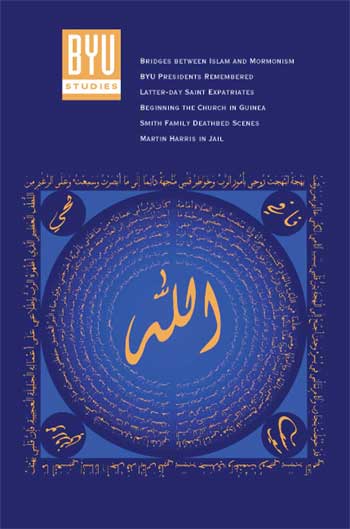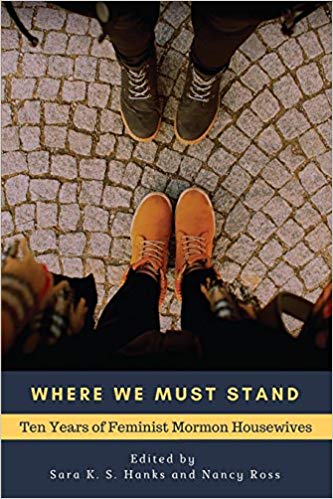Author: James Olsen
-
Times & Seasons welcomes back Mary Grey
We last heard from Mary while she was living in Jerusalem, and we’re excited to welcome back her insights as we round out the year. In addition to her stint in Jerusalem, Mary has lived on the east coast and overseas in England—though she’s a Utah native and currently resides in Utah Valley with her…
-

Muslim-Mormon Dialogue at Georgetown: The Perks of Being Peculiar
I know that I am a better Mormon on account of Muslim friends and hope that they will be able to say the same of me.
-

Book Review — Where We Must Stand: Ten Years of Feminist Mormon Housewives
reading and reviewing this book was a weighty experience for me, just as participating in FMH has been a weighty experience for its authors and many of its participants; and some of that weight shows up here
-

Times & Season Welcomes Mary Grey
Times and Seasons is excited to welcome our newest guest blogger, Mary E. Grey, who will be writing a series of posts from her current home in Jerusalem.
-
Messianism as Ethical Futurism – Reading Nephi – 19:7-17
Nephi’s eclectic messianism can be read as prophesying an ethical futurism.
-
Engraving a Record, Engraving a People – Reading Nephi – 19:1-6
All my life I’ve imagined the Book of Lehi—those tragically lost 116 pages—as having been written by Lehi. But the Book of Lehi was engraven on plates
-
What’s in a Name? – Reading Nephi – 18:23-19:1
This post is part of a series of reflections on I Nephi. If you’re interested, the introduction to the series is here. To peruse earlier entries, click the authors tab at the top of the page and then click on my name. I welcome your own thoughts on these specific verses (or on my reflections) in the…
-
Failed Revolutions and Failed Patriarchs – Reading Nephi – 18:17-22
This post is part of a series of reflections on I Nephi. If you’re interested, the introduction to the series is here. To peruse earlier entries, click the authors tab at the top of the page and then click on my name. I welcome your own thoughts on these specific verses (or on my reflections) in the…
-
Flourishing Amidst the Storm – Reading Nephi – 18:9-16
Murmuring undermines one’s relationship with God and one’s ability to cope either with the storms of the cosmos or the wounds inflicted by our family members.
-
Driven Towards the Promised Land – Reading Nephi – 18:1-8
“And they did worship the Lord”—that’s the conclusion to the whole row. I wonder at it. What was the change?
-
Win the Battle, Lose the War – Reading Nephi – 17:48-55
The eternal cosmological drama in which we’re embedded demands that we work to reflect the divinity of our enemies back to them if we wish them to join with us in our Zionic alliance of apotheosis. And whether we do, that is what we ought to wish.
-
The Children of Israel – Reading Nephi – 17:23-47 – Part II
This is a powerful ethic. I feel its pull deeply. But there is a second half, a dark side
-
Mythology, Apology, and Plausibility – Reading Nephi – 17:23-47 – Overview
In mythically promoting our history we risk undermining it—at least we do so in today’s information age. But this chapter with Laman and Nephi sparring makes me think that perhaps this is always the case.
-
God’s Demand That We Suffer – Reading Nephi – 17:17-22
I don’t care what kind of faith you have, Nephi’s idea on the face of it is loony.
-
The Narrative of Divine Command – Reading Nephi – 17:13-15
Two remarkable items: the repetition of Nephi’s mantra concerning the need to keep the commandments of God in order to prosper and to see the hand of the Lord; the placement of this mantra immediately preceding Laman’s criticism.
-
Embodied Spirituality – Reading Nephi – 17:7-12
In passages like this one, Nephi strikes me as incredibly concrete and practical in nature—much more a Brigham Young than a Joseph Smith.
-
The Fleeting Joy of Bountiful – Reading Nephi – 17:4-6
Like the story of Moses (to which Nephi often refers) the story of Lehi’s & Saraiah’s exodus is epic and foundational, as well as typological.
-
Eight Years to Eternity in the Wilderness – Reading Nephi – 17:1-4
Sandwiched in between the Daughter’s of Ishmael’s complaints about their afflictions and Laman’s complaints about the women’s afflictions (16:35-36 and 17:20-21), Nephi acknowledges that they were indeed afflicted.
-

Mourning Brother Monson
One of the clearest signals of being one of the Mormon people is our unique experience of the passing of the head of our church.
-
God’s Favor and Human Arrogance and Contempt – Reading Nephi – 16:33-39
Perhaps I ought to be grateful that no such crisis demanding the voice of the Lord has come into my life. Or perhaps I should wonder at the silence of the heavens.
-
A note on my Reading Nephi series and scriptural interpretation generally
It’s hard for us, as humans, to pry apart the empirical from the normative—and for good reasons. Facts don’t come to us bare of value. Especially with regard to those facts that we appreciate and evaluate in existential contexts (i.e., contexts related to our identity and overall worldview), they always already appear normatively laden (i.e.,…
-
Mysteries of a Diachronic Narrative – Reading Nephi – 16:26-32
Why did everyone tremble when they looked on the Liahona?
-
Faithful vs. Secular Murmuring – Reading Nephi – 16:17-25
I can’t help but picture the women pregnant, nearing full-term. Nephi rarely mentions the women or their condition, but this strikes me as likely, almost a certainty; particularly when considering Sariah’s age.
-
Wilderness Starvation – Reading Nephi – 16:12-17
Food is a huge issue for Nephi. I’m tempted to add up the verses that account for the eight years between the Valley of Lemuel and Bountiful and divide them by the number of verses speaking about food. Quantitatively and qualitatively, this is the issue—in a way that it isn’t and really could never be…
-
Exodus in Earnest – Reading Nephi – 16:9-11
Would we have the Book of Mormon if Lehi had not ignored Jeremiah’s jeremiad and embraced his dreams? Even so, can you imagine—honestly—forsaking your home and property, putting your wife and children (and grandchildren?) in significant jeopardy over a dream?
-
Marriage as Pivot Point – Reading Nephi – 16:7-8
There are times when the androcentric nature of the Book of Mormon is stark and unavoidable. These verses are rough.
-
Different Hardnesses to the Truth – Reading Nephi – 16:1-6
My typical reaction in reading this vision (or, as more often is the case, segments of the vision) and Nephi’s sermonizing and exhortations is to rejoice. This confrontation Nephi has with Laman (et al) pulls me up short, though.
-
The Filthy Waters of Life – Reading Nephi – 15:21-36 part II
Three more quick points: first, the tree is no longer merely metaphorically or symbolically, but now explicitly made to be the Tree of Life.
-
Nephi as King and Nephi as Brother – Reading Nephi – 15:21-36 part I
I … see two differenet Nephi’s in this passage, and I’m not sure which is more accurate.
-
A New (and Everlasting) Covenant – Reading Nephi – 15:12-20
I suspect that his brothers’ lack of understanding had less to do with their inability to grasp our simplistic Sunday School summary of the allegory of the olive tree, and much more to do with how culturally and theologically “other” this picture was compared to their own understanding.
